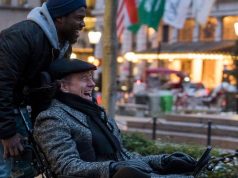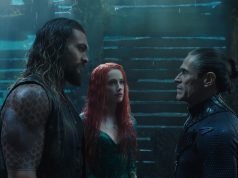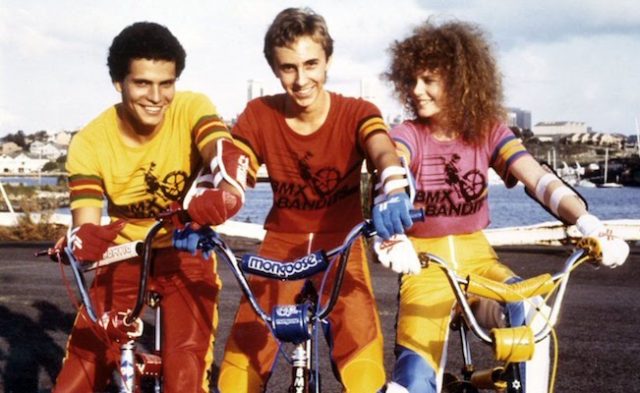
Today Nicole Kidman is known as a translucent ice-based life form who occasionally stars in movies and briefly pretended to be in love with Tom Cruise. But in 1983 she was just a frizzy-haired 16-year-old with a role in “BMX Bandits,” an Australian teen comedy promoting bicycle-oriented vigilantism. What a difference 29 years makes!
This is a goofy film, made by goofy people in a goofy country where Christmas is in the summer and horses ride people and dingoes eat babies. The setting is the beautiful ocean-front metropolis of Sydney (commonly known in the Northern Hemisphere as “Australia’s only city”), in which unsupervised teenagers loiter in quaint seaside suburbs and speak in hilariously exaggerated “Australian” accents. Two of these kids are the sardonic and skinny Goose (James Lugton) and the grinning and athletic P.J. (Angelo D’Angelo), best friends who spend their non-school days riding bicycles while clad in very awesome helmets, safety pads, and jumpsuits. Self-conscious about how uninteresting this is, the movie tries to compensate by arranging scenes of Goose and P.J. riding their BMX bikes into a montage, accompanied by intense ’80s-style montage music. Furthermore, whenever one of the bikes is airborne, however briefly or un-dramatically, we hear a space-laser sound effect, as if riding your bike off a jump you set up in the driveway is akin to traveling through time.
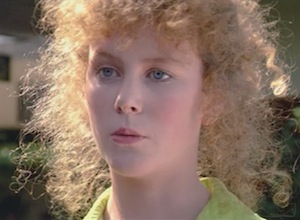
Goose and P.J. meet up with Judy (Nicole Kidman), a fellow teen who wants to earn enough money to buy her own radical bike. The boys decide to help. “If we put our heads together we can come up with something!” says P.J. “Yeah,” Goose replies, “multiple dandruff.” That’s typical of the movie’s dialogue, which tends to be smart-alecky without ever being funny (aka the “Chevy Chase in ‘Fletch'” method). The three of them head down to the bay and wander the docks, hoping to catch some seafood that they can sell to nearby restaurants, like maybe some lobsters or mussels. That’s seriously their plan. I haven’t been to Australia, but evidently there is a market for secondhand seafood captured barehanded by scavenging minors? This is a thing that Australian kids do to earn spending money? Crikey! (Please excuse my burst of profanity.)
The kids find what they assume is a lobster trap tied to a dock. They cut it loose — which is to say they steal it — and take it back to their lair, where they discover the box contains not delectable and salable crustaceans but walkie-talkies. We heard about these walkie-talkies in a previous scene, where a gang of bank robbers planning a heist were notified by their leader that he’d ordered communication devices “all the way from the U.S. of A.!” Something about the walkie-talkies is illegal, apparently, because the crooks had to hide them by the docks. They look like ordinary walkie-talkies to me, the kind you can buy at Radio Shack, but maybe they were banned in Australia at the time. Maybe the Australian government did not recognize the validity of short-wave-radio-based transmissions. Maybe Australia didn’t want to distract its citizens from the prime directive of finding and selling all unclaimed seafood.
At any rate, the kids sell a bunch of the walkie-talkies to their fellow teens and use the proceeds to buy Judy a bike. End of story, right? NOT SO FAST! The bank robbers are going to be very angry with Judy, Goose, and P.J. if they figure out it was they who swiped their equipment, which they do figure out immediately, somehow. For the next 45 minutes the movie is basically one scene after another of two goons in New Wave suits chasing the trio all over town trying to retrieve the stolen walkie-talkies, which the movie treats the way “Raiders of the Lost Ark” treated the Ark. The kids generally escape by riding their BMX bikes faster than the bad guys drive their car.
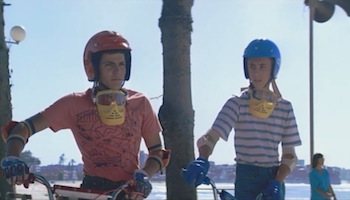
Also involved: the police, kind of. Turns out these walkie-talkies use the same frequency as the police radios, so the cops hear all the dumb things that Goose, P.J., and Judy say to each other. But for some reason when the cops respond and say “Get off this frequency,” those messages don’t transmit, and the kids have no idea they’re being listened to. I don’t understand why a gang of bank robbers would want walkie-talkies that allow them to be heard by the police without being able to hear the police in return — and want such devices badly enough to place a special order to the U.S. of A. — but I believe I have already indicated my lack of comprehension regarding Australia’s laws, criminals, and economy.
A construction crew is also using this frequency, by the way, and there are hilarious mishaps when they hear Judy or one of the boys say something and misinterpret it to be a command from the construction foreman. It occurs to me now that perhaps the reason walkie-talkies were illegal in Australia in the early 1980s is that no one in the country understood how they worked or was smart enough to use them properly.
Our three teenage heroes — “heroes” being defined as “characters who sell stolen goods to feed their bicycle habits” — split up while being pursued through a cemetery. Judy is nervous. Goose says, “We can always keep in touch on the walkie-talkies!” Judy says, “Who needs ’em? My knees will knock out a message on their own!” Oh, sure, Judy. Like your knees are literally going to clatter like a frightened cartoon character’s, and spell out a message in Morse code when they do! That rarely happens, and even when it does, it is unlikely that the Morse code message would reflect your thoughts at that moment.
Somehow the bank robbers are eventually thwarted when the kids and their fellow bike-riding teens use their walkie-talkies to communicate with one another about the bank robbers’ current whereabouts, then descend on them as a mob and throw bags of flour at them until the police arrive. (I assume the flour-throwing is an Australian thing. I’m done trying to understand.) You’d think the police could have done all of this themselves, except maybe for the flour-throwing, but they’ve been too busy eavesdropping on Judy’s conversations with Goose about how she has a crush on P.J. to do any police work. This is why Australia is still stuck under the jackboot of the United Kingdom instead of having its own queen and Red Lobster franchises.
— Film.com


